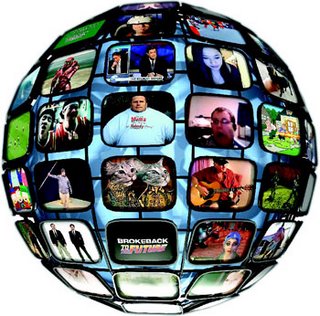
Credit where it is due. These last three entries were inspired by a converstion with my colleague Ibrar over at Holistic Educator. We were bemoaning the fact that our work seems to be more and more based on targets and how it was eating up our time to develop areas of expertise. It got me thinking. I keep telling Ibrar that he should be more disciplined with his blog and write more. But he's a busy man with fingers in many pies. His comments on the topic of deprofessionalisation should appear sometime soon (or are already there - depending on when you read this, and them).
The last thing I wasnted to say about professionals is that they should stick together. Through blogs like the much-missed Michael Berube and other, mainly American, academic sources I have followed various arguments made between the intelligent people of the world.
Although it pretty much occurs anywhere, even in the most routine discussions there are those who wish to be aggressive towards people they more or less agree with, finding slivers of disagreement and often ending up pouring bile and hatred on each other. I have heard many tales of rampant politicking and confrontation within academic departments which would make WWE storylines appear like a gentle roll on some fluffy overstuffed cushions.
In the more low-falutin' world of the school teacher, the most annoying thing I heard thoughout my time was the constant use of the world unprofessional to describe the behaviour and appraoch of others. Much of the backstabbing and undermining I put down sheer stress. When people are overworked, underpaid and appreciated, harangued and daily face physical threat and verbal abuse, they are bound to get stressed out. Which is when people lash out at others. I count myself amongst the people who sometimes indulged in this, although in my defence I must say that when I recognised that stress was making me act this way I tried hard to change my rhetoric and become more understanding and supportive of others.
However, under attack from outside forces, it is pretty crucial that professional people (whom I am assuming are intelligent, pretty studious and above all reflective) reflect on how their behaviour towards each other impacts their profession as a whole. Here is an example of this.
In my last school I had a colleague who happened to be my boss. She was clearly a driven and 'complex' individual but her professional skills were admirable. In fact she worked hard enough in a very difficult environment that she became ill, suffering a stress breakdown. Whilst she was away we discovered that in the months leading up to the breakdown, she'd dropped the ball in many areas. Things were incomplete, judgements had clearly been made under duress and with a skewed sense of perspective. As colleagues we felt sympathy and fixed as many of the errors as we could whilst covering the rest up. Presenting a united front against possible criticism when she was in no state to defend herself. When she returned to work the support continued in more subtle ways. We shouldered some of the resposibilities, taking on work and commitments so that she didn't have to.
For me, the effort of this was the start of a road that would lead, a couple of years later, to my own stress breakdown. In the final year before I hit the wall I struggled. The extra I'd taken on was not passed back over. Warning signs of my impending implosion were ignored. I made a mess of lots of things. Work was incompleted, judgements were made under the duress of illness and clearly without a decent sense of perspective.
After I crashed and burned, my boss took about half a day to get the knives out. Rather than sticking by me, as I'd done with her, she skewered me in my absence, weaving a story around my illness-affected work that abdicated her (as my boss) of any oversight and responsibility. Rather than made incompetent by illness I was painted as connivingly and wilfully unprofessional.
It led to me leaving my chosen profession, disillusioned with my treatment on all sides. I was a competent creative and committed professional yet I have now gladly left the frontline where my skills and energy were able to make a real difference. I am one of the huge number of school teachers who quit out after less than ten years.
What does it do to my proud profession when we turn on and force each other away from it? We are replaced with 'cover supervisors' and other cheap robotic devices.
The last thing I wasnted to say about professionals is that they should stick together. Through blogs like the much-missed Michael Berube and other, mainly American, academic sources I have followed various arguments made between the intelligent people of the world.
Although it pretty much occurs anywhere, even in the most routine discussions there are those who wish to be aggressive towards people they more or less agree with, finding slivers of disagreement and often ending up pouring bile and hatred on each other. I have heard many tales of rampant politicking and confrontation within academic departments which would make WWE storylines appear like a gentle roll on some fluffy overstuffed cushions.
In the more low-falutin' world of the school teacher, the most annoying thing I heard thoughout my time was the constant use of the world unprofessional to describe the behaviour and appraoch of others. Much of the backstabbing and undermining I put down sheer stress. When people are overworked, underpaid and appreciated, harangued and daily face physical threat and verbal abuse, they are bound to get stressed out. Which is when people lash out at others. I count myself amongst the people who sometimes indulged in this, although in my defence I must say that when I recognised that stress was making me act this way I tried hard to change my rhetoric and become more understanding and supportive of others.
However, under attack from outside forces, it is pretty crucial that professional people (whom I am assuming are intelligent, pretty studious and above all reflective) reflect on how their behaviour towards each other impacts their profession as a whole. Here is an example of this.
In my last school I had a colleague who happened to be my boss. She was clearly a driven and 'complex' individual but her professional skills were admirable. In fact she worked hard enough in a very difficult environment that she became ill, suffering a stress breakdown. Whilst she was away we discovered that in the months leading up to the breakdown, she'd dropped the ball in many areas. Things were incomplete, judgements had clearly been made under duress and with a skewed sense of perspective. As colleagues we felt sympathy and fixed as many of the errors as we could whilst covering the rest up. Presenting a united front against possible criticism when she was in no state to defend herself. When she returned to work the support continued in more subtle ways. We shouldered some of the resposibilities, taking on work and commitments so that she didn't have to.
For me, the effort of this was the start of a road that would lead, a couple of years later, to my own stress breakdown. In the final year before I hit the wall I struggled. The extra I'd taken on was not passed back over. Warning signs of my impending implosion were ignored. I made a mess of lots of things. Work was incompleted, judgements were made under the duress of illness and clearly without a decent sense of perspective.
After I crashed and burned, my boss took about half a day to get the knives out. Rather than sticking by me, as I'd done with her, she skewered me in my absence, weaving a story around my illness-affected work that abdicated her (as my boss) of any oversight and responsibility. Rather than made incompetent by illness I was painted as connivingly and wilfully unprofessional.
It led to me leaving my chosen profession, disillusioned with my treatment on all sides. I was a competent creative and committed professional yet I have now gladly left the frontline where my skills and energy were able to make a real difference. I am one of the huge number of school teachers who quit out after less than ten years.
What does it do to my proud profession when we turn on and force each other away from it? We are replaced with 'cover supervisors' and other cheap robotic devices.




























